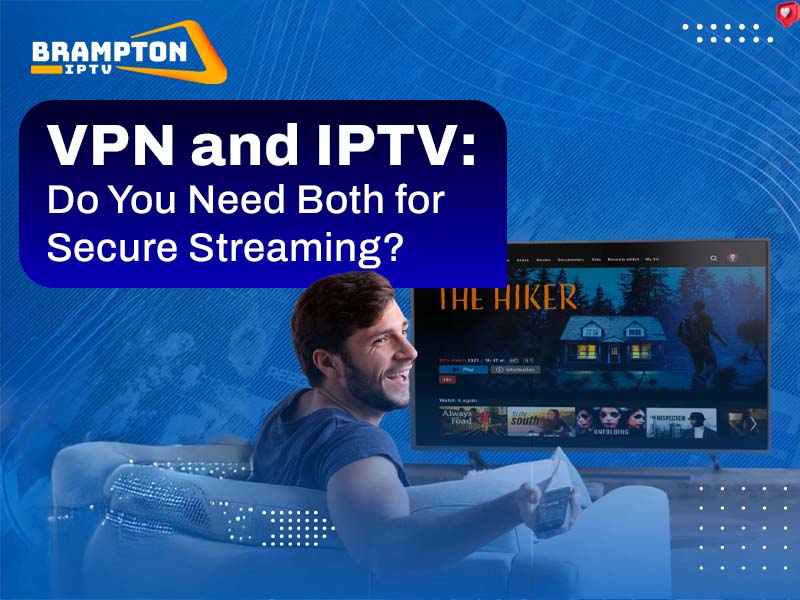
People stream TV in many different ways today. Some prefer apps, while others turn to internet-based TV. Two tools often come up in this space: VPN and IPTV. Both serve unique purposes. The confusion usually begins when users ask if both are needed together. This post explains what IPTV and VPN are, why people use them, and how they work side by side. It also looks into legality, streaming quality, and setup tips.
IPTV stands for Internet Protocol Television. It delivers TV over the internet rather than through satellite or cable. With IPTV, users don’t rely on scheduled shows or cable boxes. Content gets streamed on demand using apps or devices connected to the internet.
Unlike traditional cable, IPTV doesn’t need a coaxial cable line. Instead, it needs a stable internet connection. This switch is part of why many choose IPTV. It works well with smart TVs, phones, and tablets. For people who want more control over what and when they watch, IPTV often seems like the better option.
A Virtual Private Network, or VPN, is a tool that creates a secure tunnel between the user and the internet. It changes the user’s IP address and encrypts the internet traffic. This keeps browsing private and harder to trace.
For streaming, a VPN helps hide activity from internet providers. It can also unblock content restricted by location. Some streaming services show different shows or channels based on the viewer’s country. A VPN lets the viewer appear as if located somewhere else.
Whether or not a VPN is needed with IPTV depends on a few things. If the IPTV service is legal and available in the country, then a VPN might not be required. Still, many users add a VPN for extra privacy.
Some internet providers slow down streaming if they detect IPTV use. This is called throttling. A VPN helps avoid that by hiding the type of traffic. So in many cases, a VPN does more than protect data; it also keeps streaming smooth.
Using a VPN with IPTV has a few key benefits. First, it protects the user’s privacy. Without one, internet providers or others can monitor streaming habits. A VPN hides that information.
Next, a VPN helps prevent ISP throttling. That means faster, more stable streaming during peak hours. Lastly, it lets people watch shows not available in their region. This matters for sports, news, or channels from another country.
Yes, IPTV can work without a VPN. Still, not using one comes with risks. Internet providers might block access or slow it down. Some services may not show all available content due to region settings. There’s also the privacy concern—without a VPN, streaming habits remain exposed.
When picking a VPN for IPTV, look for strong speed, no-logs policies, and many server options. Fast speeds help avoid buffering. No-logs mean the service doesn’t store browsing data. A few VPNs known for these features include ExpressVPN, NordVPN, and Surfshark.
To use a VPN with IPTV, first install a VPN app on the streaming device. Open the app and connect to a server. Once connected, open the IPTV app and begin streaming.
This works on most platforms, including Android and smart TVs. The key is to connect to the VPN before opening the IPTV service.
On Firestick, first download the VPN app from the app store. Log in, pick a server, and connect. Then launch the IPTV app. If the VPN has a kill switch, turn it on. This keeps the data protected if the VPN disconnects.
Choosing nearby servers helps keep speeds high. Avoid distant servers unless needed for region access.
Not all VPNs work with IPTV. Some get blocked or don’t have enough speed. Tested VPNs that do well include CyberGhost, NordVPN, and Private Internet Access. These options often provide dedicated streaming servers and wide compatibility.
Streaming laws vary. Some IPTV services operate without proper rights. Watching them could break local rules. A VPN doesn’t make illegal services legal, but it helps keep user data private. In places where IPTV is monitored, a VPN adds a layer of protection.
The legal side of VPN use also differs between countries. In many regions, VPNs are legal. Still, how they get used decides if laws are being broken.
A VPN can improve IPTV quality, especially if internet providers slow down streaming. If the VPN server is close and fast, buffering may drop. Some people find HD content loads better through VPNs than without.
Still, a slow VPN can do the opposite. Picking the right server and protocol matters. Tests with different servers help find what works best.
IPTV works well on its own, but pairing it with a VPN adds privacy, better access, and protection from throttling. VPN use isn’t always needed, yet in many cases, it makes streaming more secure and smoother. For those serious about keeping their activity private while enjoying flexible TV, both tools together offer real value.